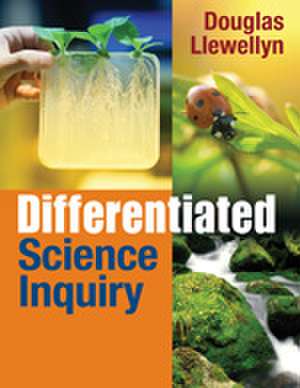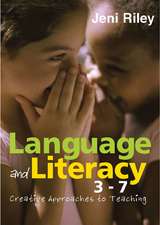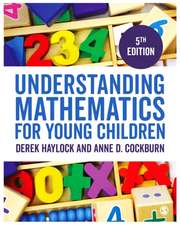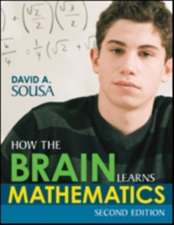Differentiated Science Inquiry
Autor Douglas J. Llewellynen Limba Engleză Paperback – 29 dec 2010
Preț: 269.35 lei
Nou
Puncte Express: 404
Preț estimativ în valută:
51.55€ • 53.41$ • 43.02£
51.55€ • 53.41$ • 43.02£
Carte disponibilă
Livrare economică 01-15 martie
Livrare express 15-21 februarie pentru 30.88 lei
Preluare comenzi: 021 569.72.76
Specificații
ISBN-13: 9781412975032
ISBN-10: 1412975034
Pagini: 168
Dimensiuni: 216 x 279 x 13 mm
Greutate: 0.48 kg
Ediția:1
Editura: SAGE Publications
Colecția Corwin
Locul publicării:Thousand Oaks, United States
ISBN-10: 1412975034
Pagini: 168
Dimensiuni: 216 x 279 x 13 mm
Greutate: 0.48 kg
Ediția:1
Editura: SAGE Publications
Colecția Corwin
Locul publicării:Thousand Oaks, United States
Recenzii
"One of the best resources I have read in a long time, this work is an affirmation of what we do and it will help us do it better."
"The author relates his strategies to real-life scenarios and includes hands-on examples that are easily implemented into any science curriculum. A must-have for any science teacher!"
"Doug Llewellyn provides yet another insightful book that can be used to improve individual instruction or guide professional development for entire science departments. This book helps teachers provide what each student needs to excel in a manner that can be sustained for years to come. The examples included within provide concrete guidance that can be applied with tomorrow’s first period."
"This very readable book beautifully ties together inquiry, motivational strategies and differentiation. With multiple examples of science lessons across disciplines, this important book provides a solid rationale for the importance of differentiated inquiry."
"This book deals with two of the most difficult pedagogical challenges science teachers must face: conducting inquiry-based investigations and differentiating instruction. It provides new insight and strategies for creating opportunities for all students to become more engaged. Along with classroom examples, the author provides practical suggestions on how to give students more control of meeting their needs. The result is student motivation and proficiency."
"Effective instruction is the goal of every educator, and this excellent resource provides detailed guidance in the use of DSI as the tool to get there."
"The author relates his strategies to real-life scenarios and includes hands-on examples that are easily implemented into any science curriculum. A must-have for any science teacher!"
"Doug Llewellyn provides yet another insightful book that can be used to improve individual instruction or guide professional development for entire science departments. This book helps teachers provide what each student needs to excel in a manner that can be sustained for years to come. The examples included within provide concrete guidance that can be applied with tomorrow’s first period."
"This very readable book beautifully ties together inquiry, motivational strategies and differentiation. With multiple examples of science lessons across disciplines, this important book provides a solid rationale for the importance of differentiated inquiry."
"This book deals with two of the most difficult pedagogical challenges science teachers must face: conducting inquiry-based investigations and differentiating instruction. It provides new insight and strategies for creating opportunities for all students to become more engaged. Along with classroom examples, the author provides practical suggestions on how to give students more control of meeting their needs. The result is student motivation and proficiency."
"Effective instruction is the goal of every educator, and this excellent resource provides detailed guidance in the use of DSI as the tool to get there."
Cuprins
Preface
Acknowledgments
About the Author
Introduction
Part I. The Meaning of Inquiry: The "Why" Chapters
1. Pathways to Inquiry
2. The Art and Science of Inquiry
3. Differentiated Science Inquiry
4. Why Teachers Differentiate Science Instruction
5. Motivation: The Key to Unlock Learning
Part II. The Mechanics of Inquiry: The "How" Chapters
6. How to Write a Differentiated Science Inquiry Lesson
7. Differentiated Life Science Inquiries
8. Differentiated Earth Science Inquiries
9. Differentiated Physical Science Inquiries
10. Making a Commitment to Differentiated Science Inquiry
Resource A. Balls and Ramps Lesson Plan: Teacher Guide
Resource B. Balls and Ramps Lesson Plan: Student Guide
References
Index
Acknowledgments
About the Author
Introduction
Part I. The Meaning of Inquiry: The "Why" Chapters
1. Pathways to Inquiry
2. The Art and Science of Inquiry
3. Differentiated Science Inquiry
4. Why Teachers Differentiate Science Instruction
5. Motivation: The Key to Unlock Learning
Part II. The Mechanics of Inquiry: The "How" Chapters
6. How to Write a Differentiated Science Inquiry Lesson
7. Differentiated Life Science Inquiries
8. Differentiated Earth Science Inquiries
9. Differentiated Physical Science Inquiries
10. Making a Commitment to Differentiated Science Inquiry
Resource A. Balls and Ramps Lesson Plan: Teacher Guide
Resource B. Balls and Ramps Lesson Plan: Student Guide
References
Index
Notă biografică
Douglas Llewellyn teaches science education courses at St. John Fisher College in Rochester, NY. Previously, he was the K-12 Director of Science at the Rochester City School District, a secondary school principal, and a middle school science teacher. Llewellyn is a frequent speaker at state and national conferences on inquiry- and argument-based teaching, constructivist learning, and science leadership.
Descriere
Ignite science learning with differentiated instruction
One type of science instruction does not fit all. Best-selling author Douglas Llewellyn gives teachers standards-based strategies for differentiating science education to more effectively meet the needs of all students. This book takes the concept of inquiry-based science instruction to a deeper level, includes a compelling case study, and demonstrates:
One type of science instruction does not fit all. Best-selling author Douglas Llewellyn gives teachers standards-based strategies for differentiating science education to more effectively meet the needs of all students. This book takes the concept of inquiry-based science instruction to a deeper level, includes a compelling case study, and demonstrates:
- Methods for determining when and how to provide students with more choices, thereby increasing their ownership and motivation
- Ways to implement differentiated science inquiry in the main areas of science instruction
- Strategies for successfully managing the classroom










